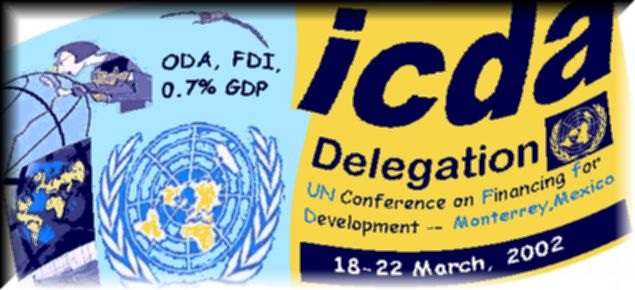
| ICDA LATEST |
ICDA Latest News
| ICDA MEMBERS |
Current Members
| WTO IMPACT LIST |
Subscribe Here
 Talk about the WTOIL!
Talk about the WTOIL!
Password Protected!!
| CENNT |
Latest News
IWGGT (in construction)
| PUBLICATIONS |
Latest ICDA Journal (in construction)
| VACANCIES |
Internship
| HELP |
FAQ's
| SURVEY |

|
Published: Monday 18 March 2002 @ 1:04pm CET
What Sector Will actually finance Development?
By Emmanuel.K.Bensah ICDA Secretariat, Brussels 28 March, 2002 If the Monterrey Consensus is anything to go by, then one is to believe that the next generation cannot survive without mobilising private flows, or private finance. The extent to which this idea has been trumpeted by both the UN (read: UNDP's Mark Malloch Brown), and the usual suspects (read: The WTO, IMF, and World Bank) serves to remind us how drastic the situation of the Global South is. How far is this true? Two articles from the French daily Le Monde newspaper, and the London Observer paper sought to address this question. According to Nick Mathiason's article "Third World finance dries up" that featured in the Observer, "investment in the infrastructure of developing countries has collapsed in the past seven years, threatening the lives of millions of people in the world's poorest countries". This has inevitable prompted private individuals with considerable wealth, such as George Soros (interviewed by Le Monde journalist Laurence Caramel) who believe, as Soros does, that "business is much more qualified than the state to create wealth." His only admonition, in his interview, is that there need to be certain "conditions" - that the state alone can create - conducive to a such-like climate. Sceptics from Civil Society would be quick to jump the gun by pointing the finger at the usual rhetoric of investment climates that only serve to promote the interests of business. True as that may be, there is no denying that the role of the public sector, and indeed the state, has dwindled over the past few decades. In fact, according to the Observer, the World Bank claimed in February that so-called 'external financing' in infrastructure projects, totalling $4.5 billion in the mid-Nineties, was down to 55 percent of the original amount ($2.5 billion) in 2000. If that is no clearer sign of disinterest in the basis of development by the public sector, then what could be? Moreover, the story, according to the paper, does not get any better: the World Bank itself has declared that the news is grim for the public sector. Nemat Shafik, World Bank vice-president for private sector development and infrastructure argued that there was frankly a "crisis whereby the public sector has withdrawn from financing infrastructure, thinking the private sector could carry the burden." Enter people like Soros who argue, quite rightly and uncharacteristically, that the "raison d'être of business is to make profit". He continues that "they will never be able to secure/assure stable economic policies and good governance", which Soros considers as "indispensable conditions for development." His admonition for the least developed countries (LDCs) to utilise international financial institutions (IFIs) as conduits by which they can attain such development, serves as a pavlovian response to the World Bank, as one notoriously quintessential IFI, to step in, but is this intervention a help or a hindrance? The World Bank, notwithstanding civil society's protestations that it executes the former par excellence would like to think it is more the former. Small wonder therefore that it argues, according to the "Observer", that unless more is done to bring in private capital, international agreed targets for eradicating poverty will fail." Despite the fact that critics have castigated, and continue to attack, the World Bank as 'a one trick pony' "too wedded to a privatisation model", the IFI is actively "seeking new ways of levering in private sector investment by offering contracts to building companies that offer in-built incentives for alleviating poverty." This is evidently good news to private investors that appear to have been the novelty at this conference on financing development. It does, however, beg the question of where the public sector has disappeared off to in the developing world. Many a civil society critic talks of how disproportionate the effects of foreign direct investment (FDI) by a multinational operating in a developing country (DC) are. Indeed, UNCTAD corroborates this in its publication "Transnational Corporations" when it writes that FDI, rather than contributing to the economy, "stifles indigenous enterprises, simply replacing host country financing without adding to capital formation or economic growth." In the final analysis, this news does prompt speculation of who will be the real winners after Monterrey? The messengers of the private sector or the 6 billion plus people going to bed each night with very little food and bleak prospects for the next days, weeks and years? Oh, I forgot: we mustn't shoot the messenger. References: Third World finance dries up, Nick Mathiason, Observer website, February 24, 2002; Trois questions à...George Soros, Laurence Caramel, Le Monde Website, March 19/20, 2002; Transnational Corporations, UNCTAD, Vol.9, N#1, April 2000. (c)E.K.Bensah, 2002[ENDS] |
|
*Please note that Page Updates are page-specific, which means that the whole site is not updated at once. You will therefore find that some pages have different dates of update.*
Copyright ©E.K.BENSAH II PRODUCTIONS. 1998-2002
| ICDA is a |
ICDA was established on December 20, 1977. It is registered in the Netherlands, with registration n#:41198114 |